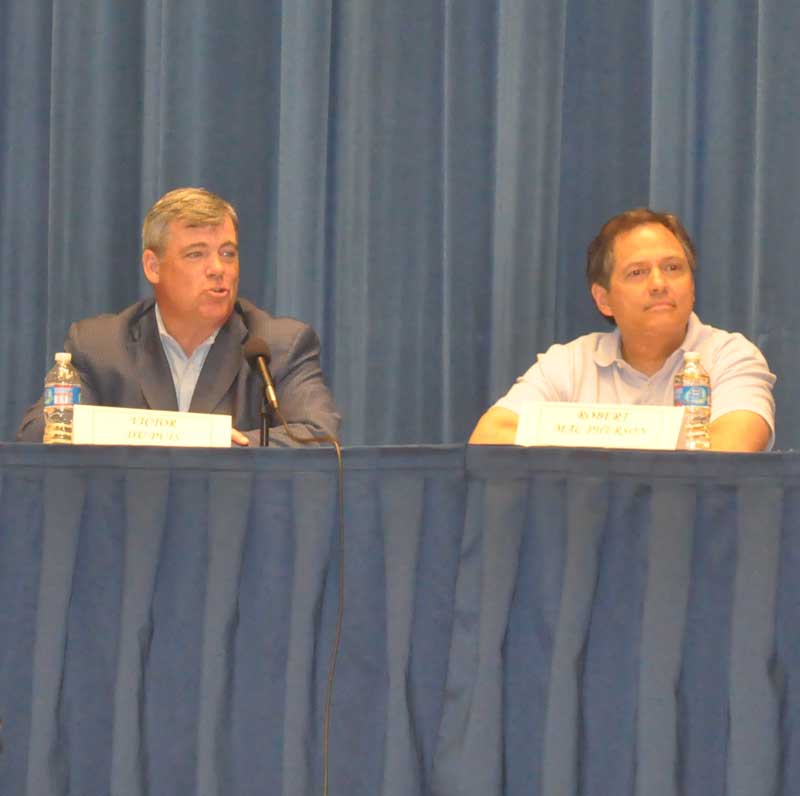Candidates in lone contested race do show differing views on HS project, outsourcing
By Mike McGann, Editor, UnionvilleTimes.com

Victor DuPuis (left) and Robert MacPherson answer questions during Thursday night's Meet The Candidates event for Unionville-Chadds Ford Board of Education candidates.
EAST MARLBOROUGH — With only one contested seat in three regions, it might not be a major shock that the prospective candidates for Unionville-Chadds Ford Board of Education were largely in agreement during Thursday night’s Meet The Candidates night at Unionville Elementary School.
With only Victor DuPuis and Robert MacPherson — the two Region A candidates seeking to replace the retiring Corrine Sweeney — showing anything like a serious difference of opinion, albeit in a friendly, even humorous at times, highly civil manner — the six candidates, including three current board members, engaged in a strictly issues-oriented event in front of a little less than 100 people.
The evening was a presented jointly by the Chester County League of Women Voters and the Parent Teacher Organizations of Unionville-Chadds Ford School District.
In addition to DuPuis and MacPherson — who face off in a May 17 primary and because of cross-filing, could still face each other in the fall, unless one candidate is able to sweep both the Republican and Democratic primaries — current board president Timotha Trigg, current board vice president Frank Murphy and current board member Eileen Bushelow were joined by Sharon Jones, a Pennsbury resident seeking to replace Paul Price, who chose not to run for reelection, answered questions from the audience.
If there was a universal theme expressed by all the candidates, it was the need to balance fiscal responsibility with preserving education in these difficult economic times.
Still, at times, there were some disagreements — especially as the evening delved deeper into controversial issues such as the high school renovation plan and the possibility of outsourcing school busing and groundskeeping and janitorial services.
Each of the candidates was asked to talk about their views on the high school renovation, whether they supported the two referendums and how they graded the project to date. Bushelow said she supported the first referendum, but not the second, when the financing plan changed, but like many of her colleagues on the dais, felt it was unfair to grade the project as it is not complete.
Jones said she supported the referendum, but was not happy with the way the project was finally approved.
“I know a lot of my neighbors disagreed with me,” she said, but that she didn’t like the sight of students being forced to attend classes in trailers outside of the school building.
Murphy said he couldn’t answer about support, as he did not yet live in the district when the votes took place, but also expressed reservations about how the project was ultimately funded.
While Trigg allowed that the “high school needed a lot of work” she said she was skeptical about the referendum, but would have supported it had the community voted for it. She said she did not support paying for the project under the district’s operating budget, as was ultimately approved by the rest of the Board of Education.
DuPuis and MacPherson probably showed their biggest policy disagreement of the evening, as DuPuis said he supported the referendum, while McPherson opposed it. While both agreed that the high school needed renovation and expansion, they disagreed with what the votes meant in terms of the opinion of the community at large.
DuPuis said he felt that much of the anger and frustration came from the method of paying for the project, not the project itself, while MacPherson argued that moving ahead with the project after it was rejected by the voters twice led to “tremendous distrust” by local residents of the district.
While neither candidate expressed unrestrained support for outsourcing busing or other school services, they both allowed it bears some study, but DuPuis expressed more reservations than MacPherson.
“I’m not a big fan of it,” DuPuis said. “I really question the long-term value on this.” He said that while a private operator wouldn’t have to pay for pensions and potentially benefits, they would still need to make profit, mitigating any likely savings for the district. He suggested that he’d rather see the district’s health insurance be outsourced — switched from the current self-insured plan to directly buying health coverage from insurers and claimed that the district could save $3 million by making such a switch.
MacPherson suggested he was kind of in the middle on the subject — and really would need to see how much it would save before being able to make a fair decision.
“For a few dollars, is it really worth it?’ he asked.
Story Continues on next page







Administrators have accepted a pay freeze.
Support staff has accepted a pay freeze.
WestChester Teachers have accepted a pay freeze.
All federal civilian workers have been given a two-year pay freeze.
Only the UCFEA is greedily unwilling to help out andvery willing to see layoffs and outsourcing or non-union workers.